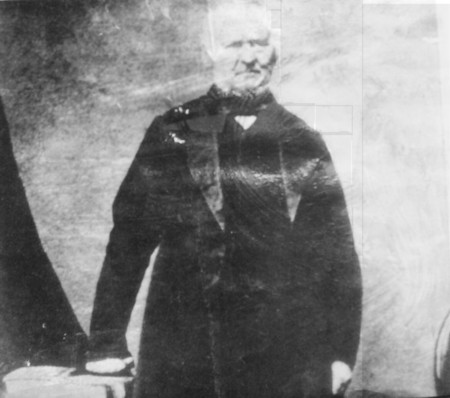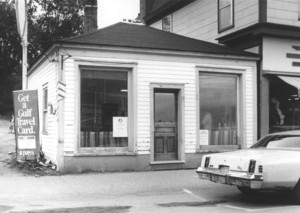

Joseph Cunard left the Miramichi area in 1850, never to return. He had resided here for little more than 25 years, yet he created such an impact on the economy of that period that his name is bandied about even today.
The name "Joe Cunard" was always in the news. Even in 1983 we read that the site of his mansion (which burned in 1957) will be the location of the federal government's Directorate of Pay Services building. The remaining gatehouse, which in later years housed a barber shop, will be relocated to the W. S. Loggie Cultural Centre where it will join the small Cunard Summer house, moved there by W. S. Loggie many years ago.

Joseph Cunard and his brother Henry came to the Miramichi in the early 1820's. Their brother Samuel of Cunard Steamship fame was a financial wizard and although he remained in Halifax, he backed the Miramichi Cunards in their enterprises.
Joseph Cunard was a great entrepreneur. He ruled an empire of ships, lumber and fish. His only competitors were Gilmore, Rankin & Co. of Douglastown; many of Cunard's business ventures were undertaken for the sake of getting ahead of Alexander Rankin, whose steady methods in the end outlasted Cunard's spectacular achievements.
Henry Cunard was a lesser partner in the business and operated a store and mill at Morrison Cove. After 1838 he became a "gentleman farmer", living the gracious life at Woodburn Farm, which still stands.
Joseph Cunard was dynamic, he was a great showman and his mills and shipbuilding yards provided work for up to 1500 men who felt very much in his debt. Indeed, it was sometimes suggested that he "owned" the people and there is no doubt that they placed him on a pedestal. When he returned from a business trip, he was often greeted with a thirteen gun salute; parades and dinners were held in his honour. And he loved it all. It is said that he was always careful to send word of his impending homecoming in order to give "his people" the opportunity to roll out the red carpet.
In 1835 Joseph Cunard built a steam sawmill which grew into a huge operation. In 1839 he purchased Joseph Russell's shipyard at England's Hollow where he built over forty vessels. He also built ships at his yards in Bathurst and Kouchibouguac. Most of these vessels were sold in Great Britain and many of them carried lumber across the Atlantic.
At the same time as he was rising in the business world, Cunard was becoming involved in community affairs and it seems as though he was active on every public-spirited committee. For example, he was a member of the Relief Committee established after the Miramichi Fire in 1825. He was elected to the House of Assembly in 1828, re-elected in 1830 and took a seat on the Executive Council in 1838.
In 1833 Joseph Cunard married Mary Peters, the daughter of Judge Thomas Peters of Bushville. He purchased the large piece of land between Water and Duke Streets from Patrick Henderson for their residence. It appears there was already a house on the property which Cunard remodelled and enlarged. The end result was a show place with a ballroom on the second floor, vaulted ceilings, fireplaces and outside there was a circular driveway with porter lodges on each side and beautiful gardens with peacocks strutting around the grounds.
However, all was not peaches and cream for Joseph Cunard. An economic depression in 1842 caused him to come very near to failure. The handwriting was on the wall.
In November 1847 his many faceted business failed. His property was so extensive that it was not until February 1850 that the business was wound up. He and his family had become established in Liverpool, England where in 1849 he sent a letter resigning his position in the Legislative Council. In 1850 he made his last trip to the Miramichi.
Fifteen years later Joseph Cunard died in Liverpool where he was a partner in a firm of Commission merchants. He was survived by his wife and two sons, Edward and J. P. Cunard.
James Fraser in his book "By Favourable Winds" quotes "On the Liverpool Exchange he was a general favourite, for he was a kindhearted and genial gentleman, full of anecdote and ever ready to let others have the result of his great experience and profound judgement."
The story is told of how A. D. Shirreff on his deathbed was holding two pistols and declaring "They're for Cunard, I'll get him yet! " A friend, Henry Wyse, got the pistols from his grasp and took them home.
When the Cunard business finally went under, the people of Chatham discovered their idol had feet of clay. He had brought them in a few short years to a degree of prosperity beyond belief. How could they accept the fact he had failed?
They couldn't. They were angered, outraged and completely disillusioned. The angry mob, when they heard the news, gathered and accosted Cunard, threatening to shoot him. Seeing a young boy, William Wyse in the crowd, Cunard sent him running home for his father's pistols. (As a humorous sidelight, Louise Manny wrote "William Wyse never missed anything during his 80 year-long life").
With a pistol stuck in each boot, Joseph Cunard swaggered and declared, "Now let's see the man who will shoot Cunard!"
The mob dispersed but the anger remained. Even today there are those who protest any recognition of Cunard's contribution. "What of all the workers who suffered as a result of Cunard's greed and ambition?" they ask. "Their hostility was certainly justified."
This may be so. Yet Joseph Cunard was one of the most impressive and colourful characters in the annals of local history. And in his favour one must consider that, although it took more than twenty years, all his debts were paid off and the Cunard estate was cleared.
Joe Cunard was one of a kind.
(Northumberland News, November 9, 1983)